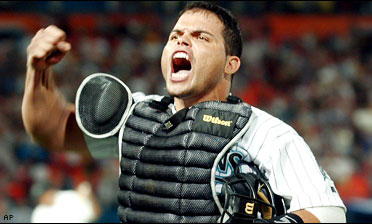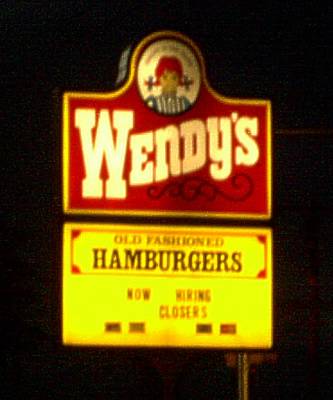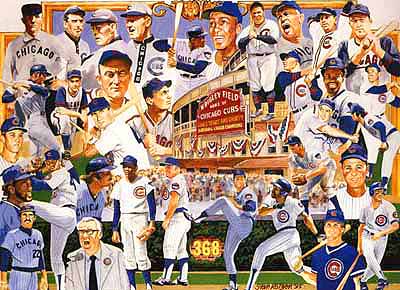On Sunday, Cincinatti Reds centerfielder Ken Griffey Jr. finally hit the 500th home run of his career, ending a quest that sometimes felt like he had hit #499 on the day he entered th majors at age 19, and we had to wait 15 years for closure. Actually, I think it was only about a week. Griffey is now the 20th member of the 500-home run club, which I think means that he now gets the Grand-Slam Breakfast for half price at Denny's ("Welcome to Denny's! Pictures on the menu: Actual Size.")
It also means that virtually any of the silly arguments you may have heard over Griffey's last few, injury-riddled seasons, that he is somehow not a Hall of Famer, now go officially down the toilet. I argued almost a year ago that Griffey belongs in the Hall, but now the National Media Bandwagon has caught up with those of us who have a little more sense, since Griffey's reached an official milestone. Jayson Stark, Rob Neyer, John "I Ain't an Athlete, Lady...and I Ain't a Writer, Either!" Kruk and others have already chimed in on the issue, as well as presumably dozens of other local writers. Monday morning, in their commentary on the subject, ESPN's morning show guys, Mike Greenberg and Mike Golic, were attempting to do the impossible:
Establish an argument for Ken Griffey Jr, and NOT Barry Bonds, as the Greatest Player of My Generation.

I don't exaclty know how to define "my generation", and Roger Daltrey won't return my calls, so I'm going to try this from a couple of angles.
Clearly, Bonds is five years older than Griffey, has more service time, and has not had the same injury problems over the last few years, so I don't think any reasonable baseball fan or writer would actually attempt to make the argument that Griffey is somehow more valuable over the course of his career than Bonds has been. So there's gotta be another way to compare them. There are, as I see it, only three possibilities for fairly comparing Griffey to Bonds.
1) Look at only those seasons that overlap for both players, by age. This would be their age 21-34 seasons, with the caveat that Griffey's not done with his age 34 season.
B) Look at only the number of seasons for which you have stats for both players. This would be their first 16 years each, again acknowledging that we'll have to do something about the unfinished 2004 season for Griffey.
iii) Look at their accomplishments through their last mutual full season by age, and count Griffey's first two years, as he should get snaps for making it to the majors at age 19.

Within option B, the question arises as to whether or not you give Griffey some kind of credit for all the time he missed with freaky injuries from 2001-2003. You can project out his numbers from 2000, (.271, 40 homers, 118 RBI) for those and pretend he was healthy and consistent. Or you can project what he actually did when he played in those seasons out to a full season, sort of pretending the variations in performance caused by his injury would not have gotten him benched or something. This still averages out to 35 homers and 95 RBI, with a ~600 at-bat season.
Frankly, I'm not very comfortable with either of these. Nobody, in any kind of official way, gives Ted Williams or Willie Mays or Whitey Ford credit for service time lost during wars. Nobody cuts Joe DiMaggio a whole lot of slack for all of his injuries. Nobody ever tries to argue that Sandy Koufax was the greatest pitcher of the late sixties and early seventies, because despite his talent, Koufax didn't actually pitch in the late sixties and early seventies. So if nothing else, the Greatest Player of a Generation must at least PLAY, right? I mean, you know, more than say, Gary Matthews, Jr.
So we can't really give him credit for stuff he didn't do, but to be nice, we'll give him credit for stuff he might do, at least this season. If Griffey stays healthy, and that's a big IF, he's on a pace for 45 homers and 127 RBI. If we add this year's projections onto his actual career numbers through last season, and use the age First 16 seasons' stats for both players, we get:
16Yrs G AB R H 2B 3B HR RBI BB SO SB CS AVG OBP SLG OPS
Jr. 2067 7647 1370 2228 417 36 526 1511 1029 1380 179 66 .291 .381 .562 .942
Bonds 2296 7932 1713 2313 483 71 567 1542 1724 1282 484 138 .292 .422 .585 1.007
diff 229 285 343 85 66 35 41 31 695 -98 305 72 nil .041 .023 .065
In their first 16 seasons in the majors, Bonds amassed more raw numbers than Griffey in every category but one: strikeouts. Junior struck out nearly 100 more times, in almost 300 fewer at-bats, playing in 229 fewer games. The two players' batting averages are nearly identical, but Bonds walked almost 700 more times, and therefore has a considerable advantage in on-base percentage and a slightly less pronounced one in slugging. He did get caught stealing 72 more times, but also succeeded over three hundred more times, at a slightly better success rate than Griffey, so Bonds gets a big edge there. Bonds has more homers, more doubles, over twice as many triples, a handful more hits and RBI, and a LOT more runs.
Runs and RBI, which are largely situational in nature, have to be taken with a grain of salt. Bonds spent the first four seasons of his career as essentially a leadoff or #2 hitter, so naturally he scored a few more runs and garnered a few less (there's got to be something grammatically wrong with that phrase) RBI in those years. Nevertheless, Barry still comes out slightly ahead of Griffey, even with a bunch of RBI he hasn't actually driven in yet this year. I just don't see how Mike&Mike can make this argument, especially considering that the first five years or so of Bonds' career were spent in the late 1980s and early 90s, before offensive numbers started exploding in the mid 1990s.

So what about their respective accomplishments through Griffey's current age? After all, by his sixteenth full season, Barry Bonds was 36, and Griffey's only 34 right now. On the other hand though, Bonds entered the majors two years older than Griffey did, so Junior's got a big head start on him there. This is a credit to him, as he was brought up with only a little experience in A and AA, and none in AAA, but made an impact immediatley. Griffey was hitting .300, with power and speed, in the major leagues at an age when Bonds had still been terrorizing the Pac Ten. Bonds didn't hit .300 in a full season in the majors until he was 26! So we can't just ignore Griffey's first two seasons, but we won't exactly be comparing apples to apples if we don't, or will we?
If you discount Griffey's first two seasons (which you shouldn't really do, as I mentioned), once again, Bonds comes out WAY ahead in virtually every category, except a handful of RBI and homers, the reasons for which we have already covered. So I won't bother to run that table again here. But I will show you what they actually have both done through the age of 33, the last season they've both completed, healthy or not.
Thru 33 G AB R H 2B 3B HR RBI BB SO SB CS AVG OBP SLG OPS OPS+
Jr. 1914 7079 1271 2080 382 36 481 1384 940 1256 177 66 .294 .379 .562 .941 144
Bonds 1898 6621 1364 1917 403 63 411 1216 1357 1050 445 130 .290 .414 .556 .970 164
diff -16 -458 93 -163 21 27 -70 -168 417 -206 268 64 .004 .035 -.006 .029 20
This table I find particularly interesting. Despite Griffey's 2-year head start, he missed enough playing time with injuries from 2001-2003 to allow Bonds to catch up, so to speak. The two players end up with nearly the same numbers of games played and plate appearances by the ends of their age 33 seasons. (That disparity in at-bats is essentially offset by Bonds' penchant for walking.)
In this comparison, Griffey's still got more homers and RBI, which seems (as we've said) to be attributable to the era in which Bonds' first few seasons were played and his position in the lineup. Griffey has considerably more hits than Bonds, but given Bonds' HUGE edge in walks, he still got on base more often, for a not-insignificant 35-point edge in OBP. As a rough overall measure, the adjusted OPS (the last column) clearly shows that Bonds' adjusted OPS was 64% better than his league average for this span, while Griffey's was "only" 44% better. Big edge to Barry, once again.
And the argument only goes downhill from there for Griffey supporters. You see, if you're going to compare these two players against each other to determine which was the best of this generation, you'll have to wait until both of their careers have ended, and neither has. I know because Daltrey called me back.

Bonds has the extremely unusual advantage of having gotten better, a LOT better, after his 34th birthday. Bonds had managed to hit over 230 homers since he turned 35, in less than five full seasons, winning three more MVP awards and setting all kinds of records in the process. That's more than Don Mattingly had in his whole career. You think Griffey's going to follow that path? Granted, Junior's a special player and everything, certainly, if healthy, capable of being a productive player for a few more years, maybe even a lot more years, but he'll have to become better than he was when he was in his mid-to-late 20's, in his physical prime, for about another five seasons, to even have a prayer of being as good as Barry has been to this point.
Ken Griffey Jr., as good as he is right now, is going to have to kick it up a notch or ten to win this title. Better get going, Junior!
 The clock is ticking...
The clock is ticking...




 New York City Baseball: The Last Golden Age, 1947-1957
New York City Baseball: The Last Golden Age, 1947-1957







 Joe Morgan
Joe Morgan
 Mike Sweeney.
Mike Sweeney.



